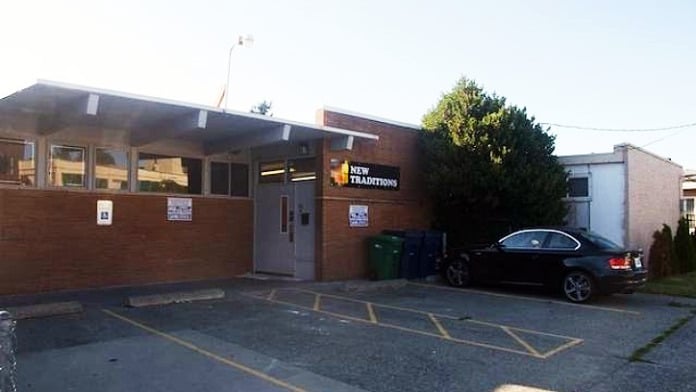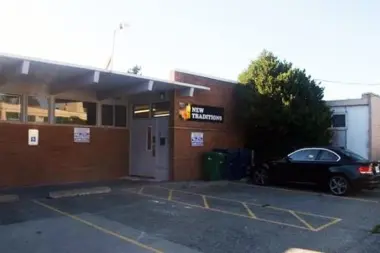If you are a woman in need of help don't hesitate to come here. You will find a team of caring women who are there to help you. It's really worth it to put in the effort and get great results from your counseling.
About New Traditions
Located in Seattle, Washington, New Traditions serves women, pregnant women, and mothers. They offer holistic treatments designed to address substance use disorders. We like that their staff and care teams emphasize empowering women to imagine new traditions for their families as they receive services conducive to healing and recovery.
The organization accepts Medicaid/Apple Health. A sliding scale is available based on income and eligibility. They assist with insurance verification and coverage questions.
The center is located in the White Center neighborhood of West Seattle. There are some great parks in the area including Steve Cox Memorial Park and White Center Heights Park, which can offer you some calming outdoor time. There are also several informational resources including the West Seattle Library.
Testimonials about New Traditions
Clients who have received services at New Traditions report feeling supported and understood, especially as mothers. Feedback highlights non-judgmental staff and personalized care. Many shared stories of regaining custody of children and rebuilding family life during and after treatment.
Deferred Prosecution Program in Seattle
Their Deferred Prosecution Program is an option for you if you’ve been charged with a DUI (Driving Under the Influence) to avoid conviction by participating in a two-year substance use treatment program. You can start by partaking in intensive outpatient treatment or a residential treatment followed by outpatient treatment and aftercare. Their team will work with you every step of the way.
Their intensive outpatient program (IOP) is designed to help you if you need a higher level of support but not 24/7 care. Education and relapse prevention services are provided as part of their programming. We value their counseling services as both individual counseling and group-based therapy are core components.
Family-Oriented Amenities in White Center
The center has a child-friendly and family-oriented environment. On-site childcare is available during treatment sessions. The group rooms are comfortable with spaces designed to contribute to your healing and foster a connection between you and your child.
Parenting support, life skills training, and advocacy are provided. There is an emphasis on removing barriers unique to women including a lack of childcare and legal issues. Partnerships with community agencies provide wraparound and aftercare support.
Latest Reviews
Rehab Score
Gallery


Other Forms of Payment
Medicaid is a state based program that helps lower-income individuals and families pay for healthcare. Medicaid covers addiction treatment so those enrolled can use their coverage to pay for rehab. When a program accepts Medicaid the client often pays very little or nothing out of their own pocket.
Private insurance refers to any kind of healthcare coverage that isn't from the state or federal government. This includes individual and family plans offered by an employer or purchased from the Insurance Marketplace. Every plan will have different requirements and out of pocket costs so be sure to get the full details before you start treatment.
Self-pay involves paying for treatment out of your own pocket. You can use savings or credit, get a personal loan, or receive help from family and friends to fund your treatment. If you don't have insurance or your insurance plan doesn't cover a specific program, self-pay can help ensure you still get the care you need.
Financial aid can take many forms. Centers may have grants or scholarships available to clients who meet eligibility requirements. Programs that receive SAMHSA grants may have financial aid available for those who need treatment as well. Grants and scholarships can help you pai for treatment without having to repay.
Sliding scale payments are based on a client's income and family size. The goal is to make treatment affordable to everyone. By taking these factors into account, addiction recovery care providers help ensure that your treatment does not become a financial burden to you or your family, eliminating one barrier to care.
Medicare is a federal program that provides health insurance for those 65 and older. It also serves people under 65 with chronic and disabling health challenges. To use Medicare for addiction treatment you need to find a program that accepts Medicare and is in network with your plan. Out of pocket costs and preauthorization requirements vary, so always check with your provider.
Addiction Treatments
Levels of Care
Outpatient Programs (OP) are for those seeking mental rehab or drug rehab, but who also stay at home every night. The main difference between outpatient treatment (OP) and intensive outpatient treatment (IOP) lies in the amount of hours the patient spends at the facility. Most of the time an outpatient program is designed for someone who has completed an inpatient stay and is looking to continue their growth in recovery. Outpatient is not meant to be the starting point, it is commonly referred to as aftercare.
Intensive Outpatient Programs (IOP) are for those who want or need a very structured treatment program but who also wish to live at home and continue with certain responsibilities (such as work or school). IOP substance abuse treatment programs vary in duration and intensity, and certain outpatient rehab centers will offer individualized treatment programs.
Treatments
The goal of treatment for alcoholism is abstinence. Those with poor social support, poor motivation, or psychiatric disorders tend to relapse within a few years of treatment. For these people, success is measured by longer periods of abstinence, reduced use of alcohol, better health, and improved social functioning. Recovery and Maintenance are usually based on 12 step programs and AA meetings.
Effective drug rehab in Washington integrates care for the whole person, offering comprehensive solutions to addiction. Treatment methods address mental, physical, and relational aspects of substance abuse.
Many of those suffering from addiction also suffer from mental or emotional illnesses like schizophrenia, bipolar disorder, depression, or anxiety disorders. Rehab and other substance abuse facilities treating those with a dual diagnosis or co-occurring disorder administer psychiatric treatment to address the person's mental health issue in addition to drug and alcohol rehabilitation.
Opioid rehabs specialize in supporting those recovering from opioid addiction. They treat those suffering from addiction to illegal opioids like heroin, as well as prescription drugs like oxycodone. These centers typically combine both physical as well as mental and emotional support to help stop addiction. Physical support often includes medical detox and subsequent medical support (including medication), and mental support includes in-depth therapy to address the underlying causes of addiction.
Substance rehabs focus on helping individuals recover from substance abuse, including alcohol and drug addiction (both illegal and prescription drugs). They often include the opportunity to engage in both individual as well as group therapy.
Programs
Adult rehab programs include therapies tailored to each client's specific needs, goals, and recovery progress. They are tailored to the specific challenges adult clients may face, including family and work pressures and commitments. From inpatient and residential treatment to various levels of outpatient services, there are many options available. Some facilities also help adults work through co-occurring conditions, like anxiety, that can accompany addiction.
Young adulthood can be an exciting, yet difficult, time of transition. Individuals in their late teens to mid-20s face unique stressors related to school, jobs, families, and social circles, which can lead to a rise in substance use. Rehab centers with dedicated young adult programs will include activities and amenities that cater to this age group, with an emphasis on specialized counseling, peer socialization, and ongoing aftercare.
Clinical Services
Group therapy is any therapeutic work that happens in a group (not one-on-one). There are a number of different group therapy modalities, including support groups, experiential therapy, psycho-education, and more. Group therapy involves treatment as well as processing interaction between group members.
Trauma therapy addresses traumatic incidents from a client's past that are likely affecting their present-day experience. Trauma is often one of the primary triggers and potential causes of addiction, and can stem from child sexual abuse, domestic violence, having a parent with a mental illness, losing one or both parents at a young age, teenage or adult sexual assault, or any number of other factors. The purpose of trauma therapy is to allow a patient to process trauma and move through and past it, with the help of trained and compassionate mental health professionals.
Staff
Shino Harada
Co-founder & Executive Director
Steffanie Rostrata
Operations Manager
Villafuerte Anguiano
Women’s Counselor
Sudpt Rashauna Dawson
Substance Abuse Counselor
Contact Information
9045 16th Avenue Sw
Seattle, WA 98106









